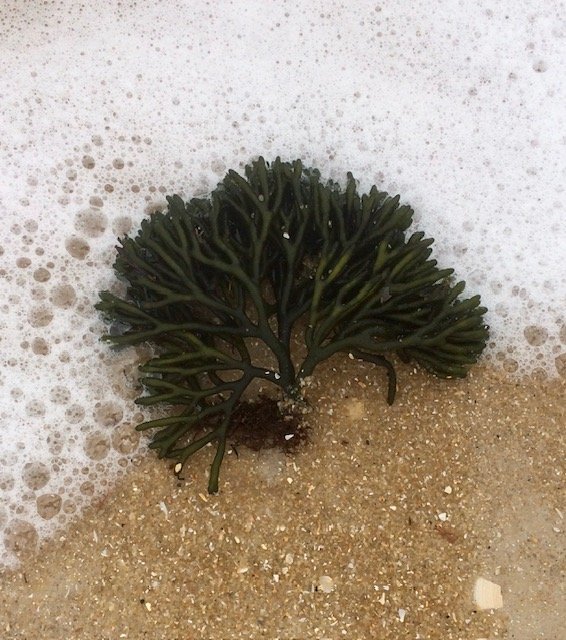Morphology
In that century
women hitched their skirts
and waded in, their fingers scooping kelp, sea lettuce,
plankton, and they took it all home
in sloshing buckets
to sketch or mount as specimens.
They knew the Latin for these species,
tough in the tides of life,
possessed
of fractal beauty.
At Ilfracombe
George Eliot fell quite in love
with sea-weeds. Margaret Gatty restored herself from the sustained
fatigue of frequent pregnancies
while exploring the littoral zone.
Men’s boots helped her keep her balance
on intertidal uncertainties.
A clergyman’s wife, she was also an algologist
—Gattya pinella, a West Australian algae
is named after her.
Bending over the water,
did she unhook her bodice
and loosen her corset―whale bones sinking in their element—
then free her chemise to bloom
like a rare species of sea flora?
Did she let salt-heavy water
lap at her thighs
and lift her breasts
over the shallow
waves.
And in the setting sun
did she look down to see
how golden she’d become, curlicues of sand embellishing
belly, breasts, and arms,
dripping finger tips the extensions
of her curious mind,
the rims of her buttocks
the body of a seal―
the name for this littoral oblivion
unknown to her.
Real
An edge cut between lawn and garden bed,
dark and wet, pleases me. I scarce believe
it exists, so virtual it’s been.
Dahlias turn to the sun, blaze.
What is it to be stem, leaf, flower from spring
through autumn, tuber all winter.
Alliums dip earthward, shower seeds from starry
umbels. Onions in flower beds next season.
Transgressions happen.
My feet sink into the lawn’s green sward.
Each blade strains toward the lovely curve,
the damp, bare earth, ready to cross
from the real to the real, underground and
over, stitching cat mint, lamb’s ear,
bee balm.
Stilled Life
Next to my slip-covered sofa it’s almost leafy.
Shadows make the yellow wall a dune,
grass-shoots grey and dull brown. The sage
green lamp, upright and still, drops
a triangle of light on the cover of The Waves.
Back-lit, I read distractedly, pluck phrases
from congregations of thoughts
and try to recall who said them.
My mind is a room for contemplation.
I gaze into its corners then open my eyes
to a torpedo-shaped bottle, circa 1870,
balanced on the kitchen windowsill,
refilled with aquamarine sunlight. It sits
alongside a 1918 postcard of Pasternak
dressed for the 1960’s, where I return
often, though chronology’s a dying art.
On the periphery, images of poise
and mystery floating in luminous October.
I drink tea and at night dream of sailing, not
incompetently. Musty linen comforts
despite misgivings, distracts me from myself.
On distant farms patches of churned earth
sprout with wildflowers and music.
After hibernation I emerge into predicament.
Highly Commended in the Sutherland Shire Literary Competition 2023
In the Picture
Lake Pukaki, New Zealand
A ray of sunlight strikes a distant chord
of water, shocks it iridescent green.
One by one then in twos and threes
we stand before the lake.
Is this the pinnacle, putting ourselves
in the picture, taking souvenirs in pixels?
We make the world up
moment by moment.
Elemental forces ignore us,
shape the scene—centred,
we’d like to think,
for our attention.
Time, keeper of mortality,
is out of character here.
Memories we aim to keep
will not survive.
The sun retreats into cloudscapes,
air dissolves in water, water into air.
We are crowned and surrounded,
lost, found, lost again.
Meadow by the Thames
Gloucestershire, England
Swathes of reeds and buttercups,
daubs of red poppies
and the knock of wood on wood―
narrowboats moored in history.
The breeze parts the grasses like hair
to expose the course of the river.
Clouds ride a current of horizon
in extravagant silence.
I inhale fragrance of meadowsweet, wade
into a sound-bath of quaking grass.
The whole fixes itself like an apothecary’s
brew, and I know where I come from.







